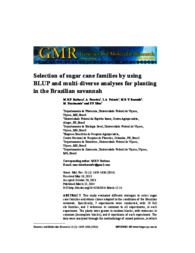Selection of sugar cane families by using BLUP and multi-diverse analyses for planting in the Brazilian savannah
Selection of sugar cane families by using BLUP and multi-diverse analyses for planting in the Brazilian savannah
Autoria: BARBOSA, M. H. P.; FERREIRA, A.; RESENDE, M. D. V. de; NASCIMENTO, M.; SILVA, F. F.
Resumo: This study evaluated different strategies to select sugar cane families and obtain clones adapted to the conditions of the Brazilian savannah. Specifically, 7 experiments were conducted, with 10 full sub families, and 2 witnesses in common to all experiments, in each experiment. The plants were grown in random blocks, with witnesses in common (incomplete blocks), and 6 repetitions of each experiment. The data were analyzed through the methodology of mixed patterns, in which the matrices of kinship between the families were identified by the method of restricted maximum likelihood. The characteristics that were evaluated included soluble solids content (BRIX), BRIX ton/ha, average mass of a culm, number of culms/m, and tons of culms/ha. A multi-diverse alternative based on the analysis of groupings by using the UPGMA method was used to identify the most viable families for selection, when considering the genotypic effects on all characteristics. This method appeared suitable for the selection of families, with 5 family groups being formed. The families that formed Group 2 appeared superior to all other families for all the evaluated characteristics. It is recommended that the families in Group 2 are preferentially used in sugar cane improvement programs to obtain varieties optimally adapted to the conditions of the Brazilian savannah.
Ano de publicação: 2014
Tipo de publicação: Artigo de periódico
Unidade: Embrapa Florestas
Palavras-chave: Cana-de-açúcar, Melhoramento genético
Observações
1 - Por padrão são exibidas publicações dos últimos 20 anos. Para encontrar publicações mais antigas, configure o filtro ano de publicação, colocando o ano a partir do qual você deseja encontrar publicações. O filtro está na coluna da esquerda na busca acima.
2 - Para ler algumas publicações da Embrapa (apenas as que estão em formato ePub), é necessário ter, no celular ou computador, um desses softwares gratuitos. Sistemas Android: Google Play Livros; IOS: iBooks; Windows e Linux: software Calibre.
Acesse outras publicações
Acesse a Base de Dados da Pesquisa Agropecuária (BDPA) para consultar o acervo completo das bibliotecas da Embrapa.

